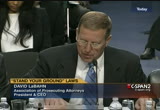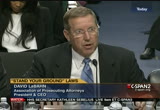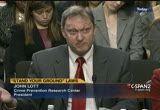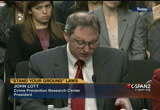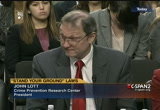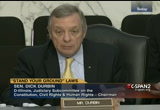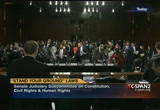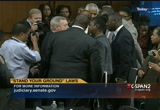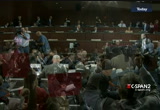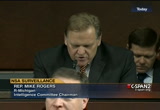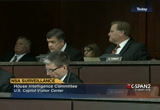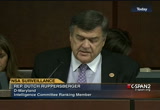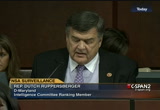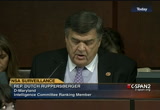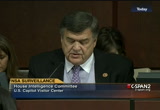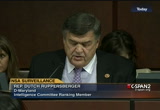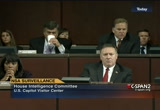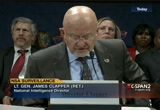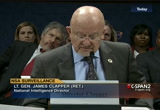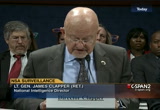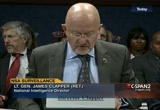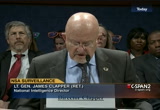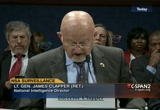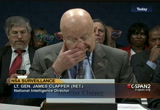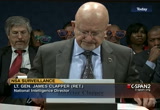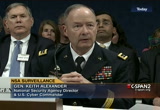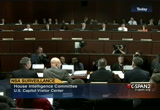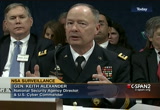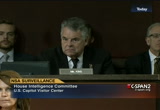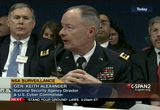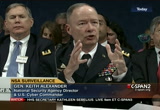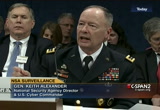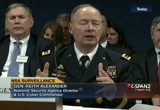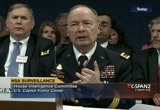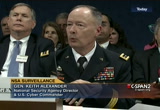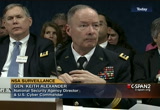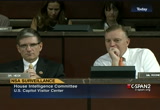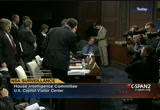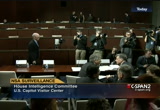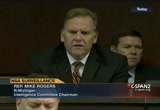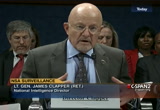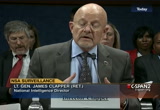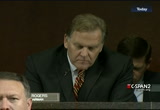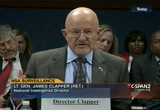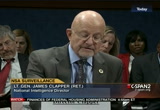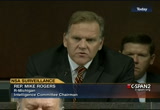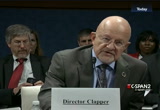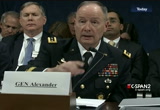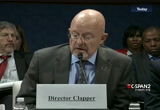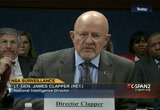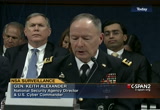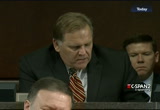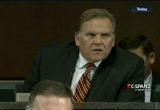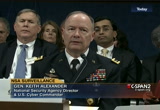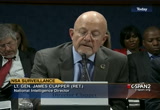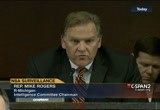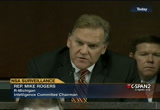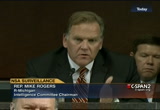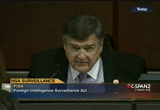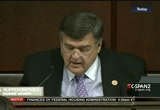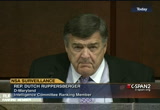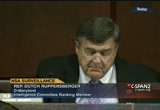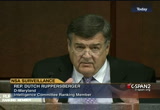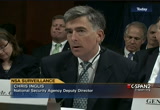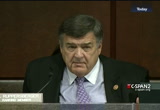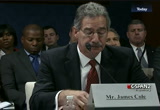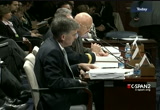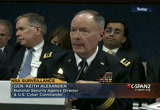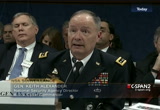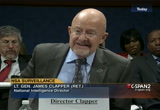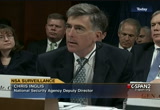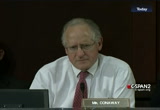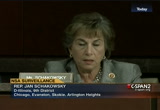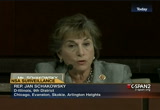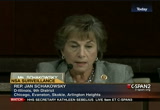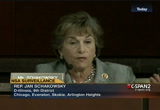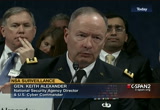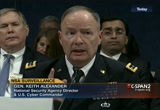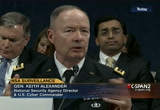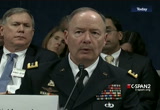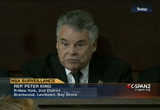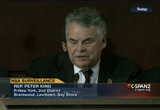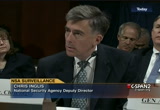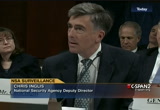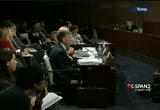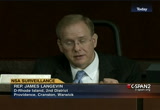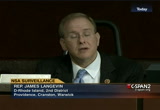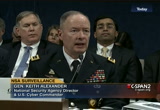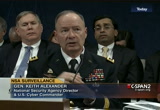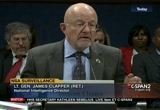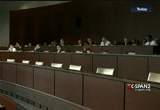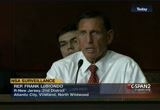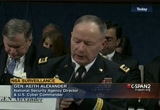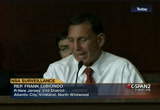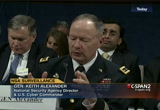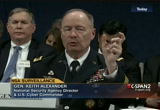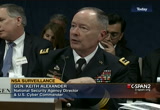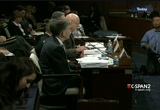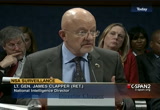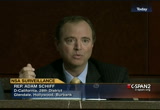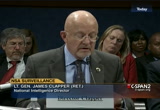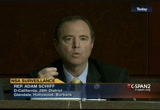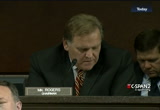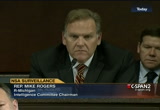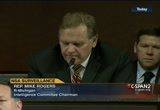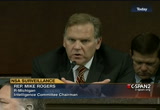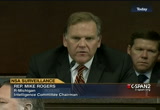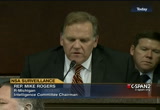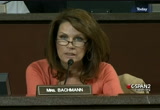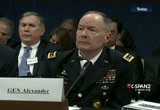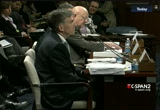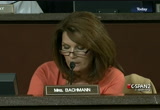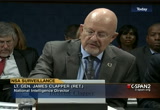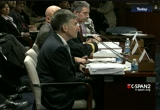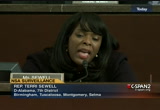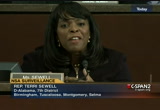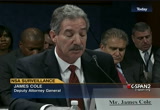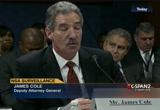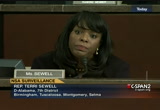tv Key Capitol Hill Hearings CSPAN October 30, 2013 12:00am-2:01am EDT
12:00 am
12:01 am
>> this allows them to go ahead and believe they are under danger and take a life. thank you for letting me. >> yeah. i would like to make a couple comments. one is if you actually look at the data, look at the tampa bay tribune data that,ing the for the factors in the cases, you find that minorities both blacks and hispanics are much more successful in raising stand your ground defenses than whites are. there's another point that needs to be made, and that is the ambiguity. it's -- one type of ambiguity was discussed, but there's the ambiguity having to face the person who is agenting in self-defense. what's the appropriate amount to retreat when they have to defend
12:02 am
themselves, and the issue here might be who do we want to make, have to make deal with that ambiguity. when somebody's facing very quick decisions that they have to make in terms of life and death. do we want to make them bear the burden to fry to figure out if at that time how far they are going to retreat, and then make them realize they maybe second guessed as i have an appendix showing the number of cases where they were second guessed. in cases where legislators and others thought second guessing was wrong that so they make it somebody needs to act in self-defense is stopped from doing so thus endangering the safety of themselves or their family members that are there. finally, mr. labahn talking about being able to go and have your stand your ground law apply even though were you the initial aggressor there, he misses part of the law that he quoted because it goes on to say you
12:03 am
can use it, but it puts strict restrictions on how you can use it in that case. it says stand your ground law is not available to person who initially provokes use of force against himself or herself unless, a, he or she exhausted every reasonable means to escape such a danger other than the use of force, which is likely to cause death or great bodily harm to the assailant, or, b, in good faith the person withdraws and indicates clearly to the the the assail lant they desire to withdraw with the use of force. bottom line is simple. understand your ground if someone initially provokes somebody else, then they are required to retreat. >> i want to thank the panel for the testimony, and once again, i thank ms. fulton. thank you for coming and
12:04 am
reliving very painful moments so we can put this hearing into context. i thank all the witnesses for your testimony. there's been a great deal of interest in today's hearing, and you can see from the attendants, large number of individuals and organizations submitted testimony for today's hearing including the naacp, the leadership conference on civil and human rights, the american nurses association, the center for media and democracy, america's essential hospitals, the dream defenders, american academy of pediatric, only counsel against handgun violence, naccp legal defense fund, newtown action alliance, moms demand action, and many, many more to be included in the record without objection. i'd like to say when solicitation was sent out for those members, publicly listed members who like to tell me their status or position on this, volunteering, if they wish, that information. some asked their statements be made part of the record, and they will at their request. those that did not make that
12:05 am
request are not included. again, i don't want to create a chilling effect on participation in american politics. it's important we preserve all constitutional rights to do so, but i thought it appropriate to find out if the members of the organization stood by that policy position that was stated. the hearing record is going to be open for one week to accept additional statements. written questions for the witnesses must also be submitted by the close of business one week from today. we'll ask witnesses to respond promptly to complete the record. if no further comments from the panel or my colleagues, i thank the witnesses for attending and colleagues for participating, and the hearing stands adjourned. [inaudible conversations]
12:08 am
>> this painting was originally painted as my grandmother's official white house portrait. in the 1960s, lady bird johnson looked for portraits to hang, to rehang in the white house. she thought it important. she looked high and low and could not find my grandmother's official portrait. she called and said, mrs. truman, do you know where the painting is in we can't find it. my grandmother says, yes, it's on my wall. mrs. johnson said, that belongs in the white house.
12:09 am
my grandmother says, no, it's my painting k on my wall, and that's where it will stay. eventually, she gave up. >> watch the program on first lady bess truman on c-span.org/firstlady or see it vat at 7 p.m. eastern on c-span, and we continue the discussion thursday as we look at mamie eisenhower. >> u.s. intelligence officials attended nsa programs that included spying on foreign leaders in a house intelligence hearing today. in the testimony, national intelligence director james clapper and nsa director keith alexander says data collected was provided to the nsa by other country's intelligence agencies. this hearing is chaired by michigan congressman mike rogers. [inaudible conversations] >> i'll only accept the decorum and only those recognized to
12:10 am
speak. i'd like to welcome the first pam today, director of the national intelligence, james clapper, deputy attorney general james cole, national security agency director, keith alexander, deputy director of the nsa, chris england. following the first panel, moving immediately into the second panel of nongovernment experts who are very knowledgeable on fisa and privacy issues. today's hearing is an open forum to discuss potential amendments to the foreign intelligence surveillance act and possible changes to the way fisa applications are handled by the department of justice and the nsa. i hope that all of our witnesses will give clear answers about how proposals under consideration in congress would affect the nsa's ability to stop
12:11 am
terrorist attacks before they occur. i encourage members to ask questions about fisa amendments and nsa programs, but today i'm going to submit my statement for the record in order to ask some questions following opening statements in relation to some of the news of the day when you get things clarified for the record which is important for the american people. we go about our business and expect a vote. we'll hold as long as we can, take a brief intermission, and there's only two votes. we should be able to recess for a very short period and return rather quickly. with that, i recognize you were opening comments. >> thank you, mr. chairman, and thank you, panel, for coming here today. hopefully, we'll be able to get the facts on the table that the american people understand what we do, why we do it, and how we are attempting to protect our national security. also, i want to thank the people
12:12 am
of the intelligence community who work every day and night to protect the security of our nation. with all the criticism leveled at the programs, it is important that we not forget that these men and women do what we told them to do within the con finds of the laws of the united states of america that we pass in doing so to keep us safe. the most important thing we can do here today is let public know true facts to engage in a meaningful process of reform to enhance transparency and privacy while maintaining capabilities to protect our nations. there's a lot in the media about the situation. some right, some wrong. much is mischaracterized, not helpful to those of us serious about privacy and national security. after the leaks came out, chairman rogers and i and other members of congress urged intelligence community to release more information to help the public understand which they have done. today we continue the open hearing to get out the fact and so that the american people hear
12:13 am
directly from the intelligence community and outside legal experts. one key fact we need to keep in mind is nsa's focus is on foreign threats. under fisa, nsa does not target americans and the u.s. and does not target americans anywhere else without a court order. there are two fisa authorities highlighted in the press. first, the business records provision known as section 215 allowing the government to legally collect what it called meta data, a phone number, length of call, not content, no names, no conversations, no content. let me be clear, again, under 2 # -- 215, nsa cannot listen to anyone's phone calls. it allows the government to connect the dots. the dots should have and like i could have been connected to prevented 9/11 and are necessary to prevent the next attack. with this tool, we could have determined one of the 9/11 attackers, hijackers, was in san diego and made a call to a known
12:14 am
al-qaeda number in yemen. i shutter to think what connections listen missed if the program were completely eliminated. law enforcement contains and analyzes these records every day to stop organized crime out of the countriment we don't want it to be easier to be a terrorist an that criminal in the country. the second is known as 702 of the fisa amendment's act allowing the government to collect the content of the e-mail and phone calls of foreigners, not americans, who are located outside the united states. the authority allows the government to get information about terrorists, cyber threats, and clandestine activities, but, again, this authority prohibits targeting of american citizens or u.s. permanent residents without a court order no matter where they are low -- located. both of these authorities are legal. congress approved and reauthorized both of them over the last two years, and no court ever struck them down. the nsa is also subject to
12:15 am
layers and constant oversight from the executives, judicial, and legislative branches of government. to make it clear, more needs to be done. the foreign intelligence surveil lansz agent must be reformed. we have worked with the administration, the senate, telecommunication companies, and other stake holders to evaluate and vet a range of options. we must improve transparency, privacy protections, and restore public's confidence. you cannot truly have privacy without security or security without privacy. we're exploring a proposal to require a declassification review of any fisa court decision, order, or decision to improve transparency and improve methods. we are expanding reporting so all members of congress, not just those on committees of jurisdictions can view the classified reporting about the programs. we are vetting a measure that would create a presidentially appointed senate confirmed inspectedder general to the nsa to provide an extra independent
12:16 am
check. we are discussing ways to change the makeup of the fisa court to correct the perception that is controlled by one political party or other. we are looking into creating a privacy advocate, the nonexecutive branch, lawyer, who would take position on the court and provide significant constructions or interpretations of the fisa law. most intriguing and challenging is changing how section 215 is implemented. can we move away from bulk collection and have a system like that used in criminal prosecution system? in which the government subpoenas individual call data records, phone numbers, no content to be used for length analysis, and we spent months working on the proposals and would like to hear thoughts on them. we brought you hear today to get your input in an open forum to allow all members and the american people to hear your responses for the themselves. i thank you for your time today, and i look forward to the thoughtful discussion on range of reform proposals. mr. chairman, i yield back.
12:17 am
>> thank you very much. we welcome the panel today and director clamber, the floor is yours. >> well, mr. chairman, we'll go ahead with the prepared statements on the fisa legislation, and we'll certainly get to the questions that we know you all have chairman rogers, ranking member, distinguished members of the committee, thank you so much for having us here today to talk about the way ahead occasion by the continuing dramatic revelation of intelligence collection programs since they are unthorsed disclosure. >> i have to ask you to suspend. for the last time, the gentleman on the left would be removed, ask the officer to remove. if there's one more example of that, i'll ask you all to be removed. the gentleman in the gray jacket with the -- on the left. thank you. very much.
12:18 am
>> said nothing about signs. i listened to your opening statement. >> you may continue. about steps taken to make the programs more transparent and still protecting the national security interest. we each have statements so i'll begin and transition to general alexander. the hearing is a key part of the discussion our nation needs about legislation to provide the community with authorities both to collect critical foreign intelligence and protect privacy and civil liberties. we, all of us in the intelligence community are very much aware that the recent unauthorized disclosures raised serious concerns that you eluded to here in congress and across the nation about our intelligence activities. we know the public wants to understand how its intelligence community uses its special tools
12:19 am
and authorities and to judge whether we can be trusted to use them appropriately. we believe we have been lawful, and at the rigorous oversight, we operated under has been effective. we welcome the opportunity to make the case to the public. as we engage in the discussion, i think it's also important to know that the unauthorize the disclosure of the details of the programs has been extremely damaging. from my advantage as dni, disclosures are threatening the ability to conduct intelligence and keep the country safe. there's no way to erase or make up for the damage that we know has already been done, and we an anticipate more as we continue the assessment and as more revelations are made. before these unauthorized disclosures, we were always very conservative about discussing the specifics of our collection programs based on the truism that the more adversaries know about what we're doing, the more they can avoid our surveillance, but the disclosures, for better or for worse, lowered the
12:20 am
threshold for discussing the matters in public, so to the degree that we can discuss them, we will. the public discussion should be based on accurate understanding of the intelligence community, who we are, what we do, and how we are overseeing. in the last few months, the matter in which activities are characterized are incomplete, inaccurate, or misleading, or a combination thereof. most americans realize the intelligence community exists to collect intelligence to protect our nation from foreign threats and focus on uncovering the secret plans and intentions of our foreign adversaries as charged to do, but what we do not do is spy on lawful americans or the citizens of any country. we only spy for valid foreign intelligence purposes as authorized by law with multiple layers of oversight to ensure we don't abuse our authorities. unfortunately, this reality sometimes has been obscured in the current debate.
12:21 am
for some, this led to erosion of trust in the intelligence community. we do understand the concerns on the part of the public. i'm a vietnam veteran, and i remember congressional investigations of the 1970s later disclosed, and i was in the intelligence community then, that some intelligence programs were carried out for domestic political purposes without proper legal authorization or oversight. having lived through that as a party intelligence community, i can now assure the american people the intelligence community today is not like that. we operate with a robust frame work of strict rules and rigorous oversight involving all three branches of the government. another useful historical perspective, i think, during the cold war the free world and soviet block had telecommunication systems which made foreign collection a lot easier to distinguish. now world telecommunications are classified, and innocent people conducting transactions are a much smaller number of nefarious
12:22 am
adversaries trying to do harm on the saim network using the same technologies. our challenge is to distinguish very precisely between these two groups of communications. there was an alarm bell went off when one terrorist communicated with another terrorist, our job would be easier. that does not exist in the world of technology, at least today. over the past month, i declassified and publicly released a series of documents related to both section 215 of the patriot act and 70 # 2 of the fisa. we're doing that to facilitate and form an intelligence debate about those who operate under the authorities and felt in light of the unauthorized disclosures, the public interest in the documents far outweigh potential additional damage of national security. these doesn'ts led our citizens to see a seriousness, the thoroughness, and rigor with
12:23 am
which the fisa court exercises its responsibilities. they also reflect the intelligence community's commitment to uncovering reporting and correcting matters that occur. however, even in these documents, we've had to redact certain information to protect sensitive sources and methods like particular targets of surveillance, but we'll continue to disclassify more documents. that's what the american people want. it's what the president has asked us to do, and i permly believe it's the only way we can reawe sure our citizens that their intelligence community is using its tools and authorities appropriately. the rules in oversight that govern us ensure we do what the american people want us to do which is protect our nation's security and our people's liberties. i'll repeat: we do not spy on nip except for valid, intelligence foreign purposes and only work within the law. now, to be sure, on occasion, we've made mistakes, some significant. they are caused by human error
12:24 am
or technical problems, and whenever we found mistakes, we reported and corrected them. the national security agency specifically, as part of the intelligence community broadly, is an honorable institution. the men and women who do this sense of work are honorable people, dedicated to do their mission lawfully and appalled by wrong doing. they, too, are citizens of the nation who care just as much about privacy and constitutional rights as the rest of us and should be commended for the crucial work in protecting the people of the country, made all the more difficult by the torn unauthorized damaging disclosures. that all said, we are ready to work in partnership with you to adjust foreign surveillance authorities to further protect our privacy and civil liberties, and i think there's principles we already agree on. first, we have to always protect our sources' methods, partners, and ways on relationships and do a better job of helping the american people understand what
12:25 am
we do, why we do it, and most importantly, the roig rows oversight to ensure we do it correctly. third, we must take every opportunity to demonstrate our commitment to respecting the civil liberties and privacies of americans. we also have to remain mindful of the potential negative long term impact of overcorrecting the authorizations granted to the intelligence community. as americans, we face an unending array of threats to the way of life more than i've seen across in my 50 years in intelligence. we need to sustain our capability to detect threats. we certainly welcome a balanced discussion about national security and civil liberties, and it's not an either/or situation. we have to protect both. with that, i'll turn it to general alexander. thank you for the opportunity to provide opening comments today. i have a prepared statement, but
12:26 am
as you know, i won't be able to read it as well as i can just tell you what's on my mind. i'll talk from the heart so that you know what we're talking about here from an nsa perspective as what i think you and the nation needs to hear. first and foremost, i've had eight-plus years at nsa. they are among the finest people in this country. what they do every day for this nation is unherald. we don't get a lot of fanfare, but it's absolutely superb. saturday, i had the opportunity to work, again, which we've done every weekend since i've been there, to support our troops in afghanistan who are under threat of an attack. we do that all the time, people in there supporting our troops, the military operations, and in an eight-plus years, no one person came up to me and said i have to work tonight or the weekend. they always come in.
12:27 am
they protect our troops. they protect this country. they have taken an oath to defend the nation and to protect our civil liberties and privacy, and they do that better than anyone i've ever seen. it is a privilege and honor to work next to them every day. what i want to tell you about is how did we get here, talk about the business record, fisa, and give you insights to what we see going on worldwide. i want to talk a little about the compliance, and then how we protect these programs, and where we need to go in the future, and then, chairman, we'll address questions i know you want to ask, and i'll drop that throughout the question portion. first, how did we get here and end up here? 9/11. 2996 people were killed in 9/11. we all remember that. what i remember the most were those firemen running up the stairs to save people to their
12:28 am
themselves lose their life. we have this great picture after a of a fireman handing a flag to the intelligence community. we deployed our forces to iraq and afghanistan, and nsa deployed 6,000-plus people forward. twenty have lost their lives in support of operations in iraq, afghanistan, and the war on counterterrorism. they know what they bring to that fight helps bring back for of our soldiers, sailers, airmen, and ma reaps. just ask general dave petraeus, general lloyd austin. they say our people were there every step of the way. while we were there, while we are there, what we learn about the threat is something that is necessary and important to the
12:29 am
defense of this country we see the threats that come into this nation. we see what a foreign intelligence agency is expected to see. the question is how can we connect these dots of what you're seeing and doing it in the least intrusive manner? thanks to you, the senate, the executive branch, and the courts, we have programs to do that. congressman king, thank you for your comments. i know what you've done in new york and the statements you've made are greatly appreciated, and i would tell you every person at nsa and in the military still remembers that day and our commitment to those people that we will not forget. that doesn't mean that we're going to trample on our civil liberties and privacy. the issue is how do we do both?
12:30 am
that's the constitution that we all swore to uphold and defend. that's what we are doing. look at the program that we have. we, as american citizens, everyone at the table is also an american citizen, have agreed that we would take our personal data and put it into the pile, a lock box, that would only be look at when we had reasonable and articulate suspicion that we have connection to a foreign al-qaeda or related terrorist group and look into that box. in 2012, we had 288 such selectors that we could go and look into that. that's it. of the billions of records, only 288. with that, we had tremendous oversight. when you look at the amount of oversight from this committee alone and from others from
12:31 am
within the dni, the department of defense, with our own director of compliance, with our own general counsel, with our own ig, and with all our compliance individuals of every level, everything we do on this program is audited a hundred percent. on the business record, a hundred percent. the data's kept separate from all other data we have. i think it's important to understand that the leaker did not have access to this data. period. the safeguards there ensure that no one else gets access to it and that no one gets a query unless it goes to the 288 numbers of the numbers currently on the list. only 22 people at nsa are authorized to provide numbers, to approve numbers, and about 30
12:32 am
are authorized to look into the data base, and that's it. when you look at the number of people that we have in the oversight and compliance that we have on this program, and what it does to protect our civil liberties in privacy, and let me give you thoughts because it's important for our country to think about this. if you look at the trends in the ct arena in 2012 it was the highest globally that it's been ever. over 15,000 people killed. in just this last month, 2336 people were killed, 1500 injured in pakistan, afghanistan, syria, iraq, and nigeria, and yet, there's not been a mass casualty here in the u.s. since 2001. that's not by luck. they didn't stop hating us. they didn't say that they were
12:33 am
going to forgive this. they continue to try. it is a great members and the intelligence community, our military, our law enforcement that stood up and said, this is our job. we do it with our partners and our allies. it's been a great partnership. when we talked about the numbers we gave early on on the terrorist events stopped, 13 in the u.s., 25 were in europe. they are closer to the threat. it's easier to get to europe, and they are going after them. i think it is a privilege and honor from the united states' perspective to know that we helped stop incidence there. as congressman king said, one incident was called 9/11. we call that one incident.
12:34 am
that should never happen again. that's what we are about here. that's what we are trying to do. i think it's important to note that we've asked industry's help, asked, okay, more accurately, we have compelled industry to help us in this manner. by court order, and what they are doing is saving lives, and they are peoplized because they save lives in our way of life. people behind me can express their feelings. that's something that we all stand up for so that they can say what they believe. we think it's important that they have the facts. industry helps because they were compelled to help, and i'll tell you there are a lot of patriots out there that know what they do saves lives, not only here, but in europe and around the world, and it's the right thing to do.
12:35 am
it's done under court order, and it's absolutely vital we understand that. where do we come from? eight plus years we've been a team for seven-plus years. this is the greatest work force i've ever met. these are patriots who come to work saying how can we defend this country and protect our civil liberties and privacy? nothing that's been released has shown that we are trying to do something illegal or unprofessional. when we find a mistake, a compliance issue, we report it to this committee, to all our overseers, and we correct it. in the business record fisa and in the 702, there have been no willful violations. under executive order, 123333,
12:36 am
there's been 12 over a decade. the majority of those were done in foreign space on foreigners. i think that's important to understand. for our foreign partners and our allies, we hold ourselves to that same standard no matter if we operate here or abroad. if we do something that does not fall within at intelligence requirement, it is wrong. we report it, hold people accountable, and if they did that willfully and disobeyed orders, then they are held accountable, and most all of those people are gone. three of them were military, two of those given court marshall, reduced in rank. half a month's pay for two months, and 45 days extra duty. we hold our people accountable and report to this committee, everything that we are doing. as we go forward in the future, one of the things we talked
12:37 am
about, this is a tough time for nsa when they say what are you doing, or why are you doing it? here's what we do, when we get together we don't whine -- well, maybe a couple times we whine, but we actually say it is much more important for this country that we defend this nation and take the beatings than it is to give up a program that would result in this nation being attacked. we would rather be here in front of you today telling you why we defended these programs than having given them up and have our nation or our allies be attacked and people killed. we've shown we can do both, defend the country and protect our civil liberties and privacy. chairman, ranking member, it is a privilege to work with the
12:38 am
committee, even though, at times, you wire brush us. you know that we'll tell you the truth, the whole truth, and everything we know every time. that's our commitment to you. that's our commitment to the country. with that, chairman, that ends my remarks. thank you. >> clock has reached 0 so i will remind members that we will recess, call of the chair, five minutes after the second vote, we will reconvene, and i ask we escort panelists to the green room. [inaudible conversations]
12:39 am
12:40 am
[inaudible conversations] [inaudible conversations] >> i'll call the committee to order, and before we get on with members' questions, and the program's in question, i just have a couple things i'd like to see if we can't get clear begin the current events of the day. director clapper, can you tell me how the intelligence community sets its collection priorities? >> yes, chairman rogers.
12:41 am
it is all centered around what's called the national intelligence priority frame work. this is a document, both a document and process that's existed in its current form since 2003. it started during the bush administration. in my time in intelligence, there's been a form of overarching intelligence requirements document. what the current version's kale the nipf which incorporates the gofort's intelligence both analysis and collection requirements, and there is a fairly rigorous interagency process in which the requirements of all the departments are gathered, department of defense, state, treasury, ect. as well as those of the national security staff and accordingly the president's requirements are embedded in this documents. that, then, represents the
12:42 am
totality of the broad intelligence requirements laid on the intelligence community. intelligence community then in turn conveys those out to each of the respective functional managers for whatever collection discipline is applicable. to name a case not here, in the case of requirements, that is translated to nga and mechanisms for translating the broad intelligence requirements into each one of the collection disciplines. there's determinations made in terms of access and capabilities to fulfill that requirement. nsa, in turn, has its own variation of this as it translates nipf requirements to actual specific needs. that process is then updated
12:43 am
each quarter, and the toalty of that, of course, is made available to both oversight committees. that, in general, is how it works. >> so would the cia or nsa be able to go out and establish its own collection parameters outside of the frame work? >> no. absolutely not. the system is to ensure discipline and so we do only what the policymakers at large have actually asked us to do. there's a resource implication here as well in that we're not going to do things extemporaneously if we're going to eat up resources, which in this day and i age, get scarcer. >> i went back and checked, and since i've been chairman of the committee, 294 alone, in your
12:44 am
interpretation, have they misled the committee on parameters of going outside the parameters of the national intelligence priorities frame work? >> i'm not aware of the case of that at all across any of the collection disciplines. >> fair to say that the white house should know what the collection priorities are? >> they can and do, but i have to say that that does not expend down to the level of detail. this is a huge enterprise with thousands and thousands of individual requirements. we don't necessarily review with the white house what the forthcoming collection deck is say for overhead collection tomorrow tomorrow or which human asset recruits which source, or in the case of nsa, which selector is usedded to fulfill specific requirements. that is done at levels below the
12:45 am
white house of the national security staff. what they do -- their engagement, though, is the output of all this in the form of intelligence, analysis, and production, and that is what they then use to the tune of the requirements to update then and refind them. >> so part of the frame work, is my understanding, that that plans and intelligences of foreign leaders would be important for the united states to know. >> that's a hearty paren yell. as long as i've been in the intelligence business, 50 years, leadership intentions, in whatever form expressed, it kind of a basic tenant of what we are to collect and amize. >> why is that important for policymakers to know what the intention of foreign leaders might and might not be? >> well, for one, to determine if what their -- from the
12:46 am
intelligence perspective if what they say jells with what's going on. it's invaluable to us to know where countries are coming from, what their policies are, how that would impact us across a whole range of issues. it is not just leaders themselveses. it's what goes on around them and policies they convey to their governments. >> and it's certainly, in my time since being in this business as an fbi agent and since 2004 on this committee, i always found the best way to determine a foreign leaders' intentions is to somehow either get close to a foreign leader or actually get communications of the foreign leaders, would that be accurate? >> yes, it would. >> and is, say for how many years -- you've been in the intelligence business a very long time. is this something new and different that the intelligence
12:47 am
committee might try to target foreign leaders' intentions to dry to determine the best policy for the united states of america? >> it's one of the first things i learned in intelligence school in 1983 that this is the fundmental given in the intelligence business is leadership intentions, no matter what level you're talking about. that can be military leaders as well. >> do you believe that the allies have conducted or at any time any type of espionage activity against the united states of america, our intelligence service, our leaders, or otherwise? >> absolutely. >> are you familiar with a story recently from the former french head of the direct -- well, the dcri -- are you familiar with that? >> that's the french domestic intelligence organization. >> let me read you a quote from that gentleman. quote, i'm amazed by such disconcerning naivety, he said
12:48 am
in the interview. you'd think the politicians don't read reports they get from the intelligence services. he's talking about french spying on our allies including the united states of america. do you find that consistent with what you know as director of the national intelligence? >> yes, @, i have to say that some of this remind me of the classic movie "casa blanca," my, god, there's gambling going on here. >> there's director of the national security agency, have the allies of the united states -- >> yes, chairman. >> that's consistent with most allyies this didn't stop last
12:49 am
year or last week? >> to the best of my knowledge, chairman. >> right. so you would argue that the ongoing intelligence activities we participate in at all levels, maybe both of you answer this, that members of congress go through that our policy folks overseas go through, is still up to date and consistent that we should all be protected against espionage activities including when traveling amongst our allies in the european union; is that correct? >> that's correct, chairman. >> mr. clapper? >> i agree, and this is kind of, i think, standard fare for anyone who travels overseas, and it's also, i think, your comments a manifest -- manifestation of the emphasis i tried to place since i've been on this job on our own counterintelligence resources which i believe are still under
12:50 am
funded. >> and this may be out of your bounds, but i'll ask it any way. striking to me that the parliament -- certainly members who come in good faith and have discussions on these issues, not really fully aware of what their intelligence services are up to. is that consistent with your career since 1963 when you talk about overseas intelligence services and their operations and how their compartmentalized away from their legislative body? >> yes, absolutely, chairman. i think that comports with my experience that often times policy makes who come and go may not have familiarity with exactly how their intelligence operations work. i'd tell you there's no other country on this planet that has the magnitude of oversight over our intelligence enterprise as we do. >> is, and to that end, if i can, mr. alexander, there was
12:51 am
some reporting that the story about french citizens being spied on by a particular slide that was leaked on a slide deck concluded that french citizens were spied on. can you expound on that a little bit? >> until >> by the united states, specifically, the national security agency. >> chairman, the assertionings by reporters in france, spain, el mundo, italy, that nsa collected tens of millions of phone calls are completely false. they cited eve screen shots of the results of a web tool used for data management purposes, but both say the perp who stoled the classified data did not understand what they were looking at. the web tool counts data records from around the world displaying the totals in several formats.
12:52 am
the sources of the data include data legally collected by nsa under various authorities as well as data provided to nsa by foreign partners. to be perfectly clear, this is not information that we collected on european citizens. this represents information that we and our nato allies have collected in defense of our countries and in support of military operations. >> so i understand you correctly, this information was likely collected exterm to the country of which it may is been reported in defense of operations op going in the world in which nato participates; is that correct? >> that is correct. >> huh, and so let me ask you this. as you study the networks of the world and talk about european union for a second if i may. is it possible for chinese intelligence services, military
12:53 am
or otherwise to use networks that you find in any nation states in the european union? >> absolutely, chairman. >> how about russian intelligence services. is it possible they use communication networks, computer networks inside the european union for what nay are up to? >> absolutely, chairman. >> how about al-qaeda? could they use, possible for them to use networks found in the european union to conduct planning operations or execution of operations? >> could absolutely, chairman. >> and would it be in the purview of the national security agency to prevent those activities, especially if it went through the european union, maybe targeted at the united states, or targeted at one of our allies? >> it is, chairman, and that's something we share with the allies. >> you collect information in those cases and share it with our allies in a way that was appropriate; is that correct? >> that's correct. it may not be actually collected in europe. because it's a global network. >> right. >> but it could be in europe or
12:54 am
somewhere else, in the middle east, asia, could be in the united states by a fisa warrant collected by the fbi; is that correct? >> that is correct. >> huh. you share information with our european allies, and if i understand you a minute earlier, they share information they have with us. >> they do, chairman. >> so the very certain accusation that the national security agency was collecting information on these citizens of the respected nation states to get on the record again is false? that did not happen; is that correct? >> that is correct. those screen shots that show or at least lead people to believe that we, nsa or the united states, collected that information is false, and it's false it was collected on european citizens. it was neither. >> well it certainly createdded an international rowel in what i
12:55 am
argue is inaccurate reporting, something we're going to have to deal with in the future. i'm glad you clarified that incredibly important. director clapper, i'll ask you this given the recent raw about leaders who may or may not have collected or numbers in possession of the u.s. intelligence services. would it, in fact, any value of that information find its way to at least the national security com in the white house? >> well, it certainly could if you speak -- i'd rather not speak specifically -- >> i understand. >> but speaking in totality, clearly leadership intentions are an important dimension of the landscape there for all policymakers in the white house or elsewhere. >> dwich the history and the likelihood the intelligence committee, the house
12:56 am
intelligence committee was aware of any foreign leadership and intention plans, wouldn't it logically the administration have access to that same information? >> >> well, as i indicated earlier, they may not have information specifically related to a specific selector or any specific collection target. what they would see, though, would be the output of this in its total dimension. >> i can imagine if there were specific output on any of that, and we're all talking almost hypothetical, it would be certainly a trained intelligence professional would clearly understand that maybe the intelligence services were following the national intelligence priorities' frame work; is that correct? >> yes. >> okay. >> you know, we're beginning to get on to the privacy issues, but i thought that important to
12:57 am
get out of the way up front. i'm concerned about where we are that we decided that we're going to name our intelligence services the opportunity as the bad guys in the process of trying to collect information lawfully and legally with the most oversight ever seen, and as a matter of fact, we're the only intelligence service in the world that is forced to go to a court before they even collect on foreign intelligence operations, which is shocking to me, and the very folks with no view of the intelligence services have been screaming the loudest including candidly some in the united states. i hope we shake out of this when you look at syria embroiled in a approximatey war, the world that china is threatening our allies, the fact that iran is working towards a nuclear weapon, the middle east is collapsing in front of us, heading towards sectarian violence in a way we've never seen in the history
12:58 am
of our country, and what that portends for the folks trying to find their way back both for the european allies and the united states. we have criminal gangs with access to technology that we've never seen before operating in every sector and country of the globe. we have proliferaters of chemical and raid logical materials that keep us up at night working in every major nation state in the world. i'm a little taken aback that we decided our intelligence servicings are to blame for what we have found again and again and again is absolutely inaccurate reporting, and if we're going to have the debate, and we should, we should do it on facts that are presented before us, and if you've done something wrong, he knows we can bring out the wire brush, and we've done it. we -- the way we go forward is to make sure our programs are protected and the people, by the way, who have taken the oaths
12:59 am
and doing their beth, not be demonize in the process. this is the time for leadership in a very dangerous and chaotic world, not a time to apologize. i hope you pass along to the individuals that hopefully they can keep doing the work, and we'll fight out politics up here, and we'll get it right. we know that that 9/11 road was paveed with a lot of very good intentions. we ought not to walk down that same road again. >> yeah, okay, as far as questions are concerned, number one, i believe we need to increase transparency and regain public's confidence in the programs the intelligence community uses to keep us safe. a way to do this is release information on the program and processes. general clapper, do you feel we can declassify fisa court decisions, orders, and opinions in a way that protects our national security, but also gives the american public more insight into what is legally
1:00 am
allowed and what is not? >> i do, and we have in concert with the interagency, particularly the nsa and department of justice, released a lot of documents, over 2,000 in the last two or three months with certain caveats. as i indicated in the statements, we certainly want to make these as transparent and as available as possible, but we also want to ensure that we protect sources, methods, techniques, liaison partners, and importantly, targets. with those caveats in mind, i agree with you that we can and should, and that -- and we have been doing so. >> okay. second question. all of these programs are already subject to executive, judicial, and legislative branch oversight, but the -- we're looking to see if we can do more
1:01 am
to be more transparent. now, general alexander, do you feel a presidentially appointed inspector of the nsa provides an independent check? do you feel it necessary? >> well, i think for certain it won't hurt. i'm not sure it would stop anything that happened. i think in the public's interest that you and the public would know that we're being increasingly transparent so i don't oppose that. anything that we can show we're being transparent is a step in the right direction. >> okay. i think that's where we are really going. i know based on testimony we have here i think of the oversight this committee had throughout the years, we feel -- i feel strongly that the men and women work in the intelligence community follow the laws and procedures and processes in leadership we put in place, and that's why it's extremely important, though, that we get back the confidence in the american people. unfortunately, with a lot of the
1:02 am
media that's been out there, a lot of the media that's not been based on fact, and allegations that are out there that are really to gain in some situations a -- what i want to say -- putting out a situation where an inflames or scares people, and that's not way we need as americans. we need the american people to trust the government. what we need to focus on is that transparency issue, and that's what we are trying to do. we need to do something in that regard. now, the final question that i do have, when it comes to changing the business records provision, that section 215 data, our committee is evaluating whether we could get away from the bulk collection and move closer to the system used in the criminal prosecution system of our country. the telecommunication providers would respond to a subpoena and give the government information about data. phone numbers, no content, the
1:03 am
information will come from what the providers already have in their business record. as i said in my opening statement, this is not the most operational challenging proposal and we have a lot of issue from operation, tech technical pointf view to move forward. it's important to evaluate what keeps the operational capability of the program to keep our country safe. we talked about that. you testified that this does keep our country safe. i think there have been statements that have said if we had this program before 9/11, there was a good possibility that we would have identifieded the fact that one of those terrorist was in the united states coordinating the attack. it's like finding a needle in a hay stack. if you have to -- the terrorist being the needle, and if you need to find the terrorists throughout the world, you have to have the hay stack. that hay stack is basically no one's name, address, just a number and duration of the call.
1:04 am
notwithstanding that, we have to move forward and try to put together a system that allows the american public to trust what are doing. now, let me ask you this. do you think that a program such as this by going to the providers and as we do in criminal cases instead of us, that the government holds that data. do you have an opinion whether it works, and then i know, again, if there are operational issues, just discuss them with us. >> congressman, happy to take that question. let's say -- >> thank you. >> as we discussed with the committee before, and you asked that thoughtful question a number of times causing us to take study of this question, there are numerous architectures, technical architectures possible and viable where you place the data as a component of the architecture. there's four features essential, four features present in today's extannuation, the architecture today. we have to have controls placed on this such used only for the described purposes that the
1:05 am
court authorized. second is that it needs to have the breadth, the hay stack as you compromise this and put it together that it's such when you have a quare rigorous oversight, you have the whole answer. looking for a terrorist plot in the united states, the answer of i didn't find one is an answer you take to the bank because you have the breadth, and you have to have the depth. you have to know you have a father enough, you look far enough back in time that you know that there's something that if it's in its insip yent phase two years ago and it's quiet, you can see it in that phase. we talked about having that data for five years, which we do today, or as little as three years, which we still think would meet that need. finally -- >> i have to stop you there. i understand providers by fcc rules keep it for 18 months. >> they keep it for their own purposes. they don't keep it to respond to the government. >> i know that. >> they, therefore, don't keep it in the form and format making it such that you meet the fourth requirement which is it needs to
1:06 am
be available in a timely way. minutes count when we support the fbi and protection of a plot that's in that moment of time ongoing, agility counts. architectures meet the four criteria, how we assess any particular recommendation the committee might make and happy to meet and work with the committee to that extent. >> all right, do you have comments op that, on the data 215 # with the providers? >> i agree with what was said. >> that was a good comment? >> no, articulated exactly whatever architecture scheme we come up with as long as the four requirements are met, we can -- >> the justice department attorney, mr. cole? >> [inaudible] i'd agree. >> okay. >> with the evaluation of that. >> i yield back. >> >> mr. chairman, general alexander, thank you for the heart felt defense of your team, great people, and unlimited
1:07 am
experience comports with the broader longer experience. thank you for that defense of their efforts on behalf of americans, and, tom, thank you on behalf of me i appreciate it as well. i got two questions, and i'll ask them at the same time and allow general clapper to think about the answer on the second one. opening remarks talked about briefly the oversight that goes over all programs. if you walk us through the various layers of inspector generals, compliance officers, steps going through there to make sure we get at that process, and then, general clapper, give us a guess as to the total man hours and dollars that we would use in that oversight process based on your experience, so general al exapedder? >> congressman, thank you, and thanks for the words for our people. i'll start with the oversight that we have at nsa. we have an inspector general and a general counsel who have responsibilities for overseeing these programs. working with this committee and
1:08 am
with the administration, we set up the directer of compliance. this is another separate office that looks specifically at these programs and our other collection programs to ensure that we do this right. we have a few hundred people that actually audit and track what our folks do every step of the way, so within nsa we have app extremely healthy compliance and oversight, and there's great comments by brookings institute and others measures what we expect in any world class organization. the dni has an inspector general and general counsel overseeing what we're doing. the department of defense has a general counsel and inspector general that oversees what we are doing, and the department of justice, international security division oversees what we are doing and working with us in the court and the white house. we also have this committee and the senate select committee op intelligence, and, finally, for the programs that fall under fisa, we have the fisa court, and everything that we do in
1:09 am
that respect goes up to the court, and i've had to personally appear in front of that court sometimes to address mistakes that we've been -- that's we've made, and you know whenever you appear in front of a federal judge, and you've dope something wrong, this is not a happy time. i found them to be completely professional while they may not understand it. they have absolutely hammers us in trying to get this right, so all that you would hear about that. >> real quick, there was an editorial, today or yesterday, that referred to a vague description provided the fisa court on what's going on. do you ever use the word "vague" in relationship to your fisa court experiences? >> absolutely not. i think at times they take, you know, ironically, an adversary relationship in discussing this. they will argue this out with us. they will tell us what's wrong with the things as we put in draft, and the justice department actually does a great job with that. i wanted to end up with two
1:10 am
others. the civil liberties and privacy officer at the dni, al exjoel, is superb in ensuring what we do, and as many as you know, we are hiring a new civil liberty and privacy officer for nsa to ensure we do this right as well. that's the oversight and compliance. >> any restrictions op that civil liberties and compliance officer as to what they could look at within that role, any restrictions? >> no restrictions as long as it complies with the law. >> all right. general clapper, how many man hours and money? >> i can't off the top of my head, but i will tell you it's easily tens of thousands of man hours and millions and millions of dollars that we spend on oversight of this program. if you just take the 300 compliance officers of nsa alone, let alone the rest of the apparatus of nsa that is devoted to oversight, my staff, dod's staff, the department of justice, the fisa court, the civil liberties and privacy
1:11 am
officers, igs, and the amount of time they spend, it is very costly program in terms of both manpower and dollars. i just don't have a figure. >> one last comment, reflection, is there anything either one of you can think of within your authority to do to address civil liberties and privacy issues that you're not doing? >> from my perspective, no. one of the things, and i was just going to have chris add one element if i could on here to your question. >> we'd actually just described a note to ourselves, but at nsa, the annual dollars we spend on this, the 30 million, and we have 300 full-time e qif lance, but what i scribed on the note is it's everybody's job. everyone has a role to play in compliance. we bring our employees in on their first day whether military or civilian, we give them all the oath of office, tell them it's to the constitution, the whole of the constitution, and that each and every one of them has a responsibility no matter
1:12 am
what they do to ensure what they do complies with the law. it's not just the outcomes, but the path of the outcomes that matters, and full-time compliance works every day with every one of us. >> to answer the question of what else can we do, i think we're already embarked on this, and this gets to what congressman was talking about which, of course, is more transparency. to the extent that we can make these elaborate processes more visible to the publicly, particularly to give them confidence in what we are doing, that would be something that we recognize we need to do, and we'll do more of it. >> if i could, we also have courses that the folks have to go through. if they are handling any person, every person including myself, has to go through how we handle u.s. person's data. you take a course and pass a test, everyone. everybody has to take who deals with the business record, fisa has to go through a series of
1:13 am
courses. everyone who deals with foreign intelligence data has to go through a series of courses to handle that data, and they have to pass a test, and most of those are almost everyone we have is an annual certification process, and in this business record fisa, there are at least six courses in 702 that people have to go through. this is a significant training thing to ensure that we handle the data appropriately. >> again, general alexander, thank you for what your team does, yours as well. i yield back. >> thank you very much. >> thank you mr. chairman. general alexander, we've been in many, many meetings together. i have to tell you your robust support of your staff and your calling them patriots, i felt implied that someone was saying
1:14 am
that the people who worked for the nsa were impugned as not being patriots and not working hard, and i have to tell you that i have never heard that. i think people have questioned the policies of the nsa. i think policies have been carried out and questions, but they have been carried out by patriots carried out by the fact that the majority of the congress actually voted to end the surveillance program, and i am certain that you are talking to them as not patriots. the two individuals who wrote, one republican, one democrat who -- yeah, one republican, one democrat -- who wrote the u.s.
1:15 am
1:16 am
it. >> the reason why it is important is because it is a policy issue that has broad implications. it could put united states is a difficult position. sources and methods but we're the intelligence committee period we did not know that. now all of us are dealing with a problem with our international relations. there will be changes what i heard was a robust defense of the status quo. that is not what i have heard in other hearings. i heard the different ways
1:17 am
we could measure how we use the of the data -- metadata if the people who are concerned about that, that is a lot of patriots deal that this must be changed. i have a couple of questions. what about having an official outside the nsa to provide prior approval of reasonable particulate suspicion in order to operate a name? and ask for that information? >> if i could my intent was not to say here in congress was less noble my intent is the discussion of the nsa is to let you know, what i see
1:18 am
of the people executing these responsibilities it was meant nothing against anyone else but i feel i have a responsibility to stand up for them. you know, most of these people. >> again that implies they need to be stood up for no one has suggested some boyle and patriotic employees of the nsa are the problem for you can take responsibility but they do not need to. >> i think perhaps in discussion from my perception i don't read all the newspapers but some of this stuff that comes out looks that way so i want you to know where i sit on this to tell you i think we're doing the right thing. that doesn't mean we should change -- and should not
1:19 am
change and some partners absolutely vital to this country we need to ensure rebalance those partnerships. i agree with a deeper said it is a policy decision i do think we ought to look at that. we ought to look with our allies where we are today it will take allies but i want to be crystal clear for our people you helped to set this up to answer the real question to help set up the compliance program. to audience and the real question the answer that i see we tried that a couple years ago with the court it got up to nine days the court to davis back the authority i would propose a counter offer but everything is dead 48 or 96 hours so we beat the time lines for
1:20 am
seven these operations where time is of the essence i use the case where you cannot afford that. we would be willing to work with you with the committee. >> your time has expired because of technical difficulty you could have one more question. >> currently the nsa holds for five years the business record data. many people have suggested that is too long. two or three years what do you think about shortening if nsa or some other entity? >> our analyst the next three years is probably the least. if we did that it goes back
1:21 am
to what the congressman said. three years makes sense. >> i yield back. >> the key for your leadership general alexander all the of outstanding men and women you really have to disagree with my good friend we cannot go without one day without seeing snoopy or a scandal you very seldom see the word patriotic. just as attacks on new you can tell those to your people in to defend your policies and the individuals it is solely a matter of time before somebody asks
1:22 am
for a constitutional right but director inglis you talked about whether that metadata controlled by the company or nsa there could be delays with the time because it is a race against the clock. if you could explain to us maybe it does not sound like a lot but it could have resulted hundreds if not thousands how important was section 215 as far as timing to save that plot also
1:23 am
discuss the extent of that plot. >> on behalf not just denis say but i want to thank you for your staunch supporter of the men and women in the intelligence committee. i will turn to the real authorities that illustrate the need to director inglis. >> i will take it back at that. as you recall early september 2009 while monitoring the activities of al qaeda in pakistan and is a noted contact to someone in the united states we tips that to the fbi they determine the identity that is that authority. then using the 215 authority that reasonable particular
1:24 am
old suspicion recap for their connections in new york and elsewhere the fbi tracked him making his way from colorado to new york in hindsight we know he intended to mount a plot the biggest since a 11. the timeliness we saw him on the move making his way to new york city but we did not know what we did not know. little was the destination the york or something on route so we help them to focus on what they should to perhaps rule out or they could save resources to concentrate on the destruction of the plot. they did ultimately at the end of the day it did not happen is another story that cannot be written about not because it is not secret but because it never happened. that is our job to prevent disaster.
1:25 am
>> to make another point of section assad often times the metric used to evaluate is the number of plots for real the recent case with al qaeda and other threats in the east of 20 diplomatic facilities we discovered some never numbers of selectors that point to the united states all were checked out no domestic nexus to any plotting. i would add plots foiled also peace of mind metric to rule out that you can use this tool. >> the clock sarin working order now. >> was hoping i could get a
1:26 am
couple of extra minutes. we will take your requests -- when this is for your service to the country and on the years they have been on this committee and all the years general you have appeared i always found you to be very forthcoming in the programs we are debating although they may have changes i we sound you have bent over backwards to operate within the confines of the law in the constitution you take these issues very seriously i appreciate to have this discussion in the open forum ended think it is important that the american people have confidence in what we're doing in the nation's
1:27 am
best interest to protect privacy and civil liberties altogether. for the past several months obviously i have heard concerns of the scope and character loudly and clearly my colleagues on the committee have as well. and i hope the information from this hearing will help address the legitimate questions raised on these issues and i think the more transparent weekend we the better are we looking at the scope of our intelligence to protect our nation from harm? i'd like to talk if we rebalance what the trade-offs are because if
1:28 am
every action is of a cynical reaction much of the u.s. a patriot active we do that what are the ramifications what are the areas we could curtail surveillance what is the impact of that? >> thank you for your staunch support over the years. with respect to the business record my concern is right now one key way of what we have of connecting with those numbers passed to the fbi is the business record fisa. as chris snorted these numbers connected to other
1:29 am
numbers in two sets of terrorist activities if you don't know what those numbers mean you just pick out a number you don't know if you face the threats or something else the fbi needed they are associated with other terrorist activities with a significant the event. if we take away their program you create a gap that is a risk that congress and the policy will make up. we will follow the laws that you establish as the policies that are set up but you ask me is there a risk? yes. we know that because that is where we existed with 9/11 it was one incident catastrophic i don't know if we will always be successful in the future.
1:30 am
we cannot guarantee that but my concern is if we take away a program file date to defend the country i think it is wrong if there is a perception if it exists because we have not articulated it well enough so people understand how we protect the privacy and what we do. that is something we all try to do. and we have to help the american people understand it. >> a hand in all of this, whether we amend a tool or remove it entirely, it is the same impact as a reduction of capability by sequestration. of the net effect is we will do the best we can with the tools and capabilities really given it is incumbent
1:31 am
to recognize the fact when that happens we have greater rest. -- risk civic my time is expired. with but a key for your work we will get this right it is vitally important we obviously give confidence to the american people we're doing everything possible to operate within the confines of the law and the constitution at the same time we have to have these capabilities in place with the threats we face as a nation in the checks and balances for the better to make sure the american people have confidence every things are done the correct way. >> thank you, mr. chairman and. general alexander, thank you for your service by the
1:32 am
specially your team and some of the colleagues to recognize the recent developments that have called so much into question the fed has cast a dark shadow with the intelligence agencies and by nature of the attacks that are coming on the people that work for you. far too many people in america september 11 is a distant memory. you said general alexander that the fact we have not had an attack with mass casualties is not an accident. also what seems to trips to the end of the world to the middle east your folks those who place themselves in the
1:33 am
incredible circumstances patriots beyond belief cannot talk about it or discuss what a great work is being done but they need to know that some of us are appreciative and if more of america knew they would be more appreciative so i want to reemphasize that message that without them this country would be in greater peril. so can you describe how in this day is taking steps under the collection of fisa? >> what we're doing is working with these gni in the administration to get more information we are trying to push this so people know what we're doing and why we do web. the greatest depth is the
1:34 am
hiring of the civil liberties and privacy officer to have a front door we are transparent and take it seriously that is a huge step forward. there is more we have to do it is difficult to give any information out because of the concern of giving classified information to put our nation address that is the concern we worker way through it our team behind me are working to help push that out with the rest of the intel community. >> you talked about this already but because there is so much attention i would ask for a little redundancy to describe to us how nsa projects u.s. citizens' personal data.
1:35 am
>> congressman there are several things we do to protect u.s. persons data. is services training sir ready is trained the fact he will bump into u.s. persons data on the internet today is very likely. there is some way to minimize the u.s.% with the u.s. person is coming not just us but also a company or green card holder someone working in a foreign government that is dual citizen all of those u.s. persons we have a series of attorney general procedures to handle that is the first up the with the court ordered programs we have special training we have to go through and this is important for the question now you're asking every time we make a query for the
1:36 am
analyst has to have the written record why this is being looked at that is the audit to both the event finland the analyst does the query every action that they do is overseen. once they get all the data out it could only go to people who are cleared to receive it which is the fbi and a small group of people would get the business record the way we handle it there is a set of procedures to go through. from my perspective is the most overseen program that we have. and to talk about the access control that we have for the program only those numbers
1:37 am
would actually ever be queried. somebody has to authorize a list first we set those rules that ban the oversight then we review and audit everything that has been done. from my perspective the way we handle it to accomplish disinformation on the foreign side is to recognize that because you are asking the question if that director clapper talked about the national intelligence prairie the framework we have to stay why we do it what is the purpose and what are redoing? said that goes along with the options so people know the answer question that we just go after data so that perception reid just collect all the content is erroneous
1:38 am
>> i yield back civic figure for being here and your service. i have a question for urd director clapper and director alexander. under the national security act the intelligence community is required to keep the intelligence committees informed of significant intelligence activity. without confirming or denying the most recent press reports of eavesdropping of the leaders of the allied countries, would you consider a wiretap on the leader of the allied country to be a significant activity required to be reported to the intelligence committee? >> it's here in the context of what we try to keep the congress informed with the
1:39 am
totalitarian -- totality and what we submit with our justification books coming by and large complied with the spirit and the intent of some law. not to say we could not do more but i put more on written notification since i has been in the job in the statistics would bear that out. the fact we don't necessarily report each and every selector or dependent on the general rubric of leadership intentions that is something we could discuss with the notification that we have lived up to the requirement.
1:40 am
>> i am not perfectly sure what to make of that answer i think if you tap the full line of a foreign leader that is a significant intelligence activity that should be reported to the committee. i don't mean in general terms to tell the committee i am not saying this is the case but if you would tell the committee that you have high confidence that this country, germany, france, or another would continue the troop commitment in afghanistan after a certain date but don't tell us why you have that high confidence that is not considered high intelligence activity and they certainly think the intelligence activity to have that flowback that we see today would be something you would want to report with considerable detail to the committee. >> there are many things that we do with intelligence
1:41 am
that, if revealed would have the potential for all kinds of pullback. >> i don't doubt that but that is what should be reported to the committee it is a policy decision for us to make it is it the worst of the rest fifth in light of the information that we gather? we have a lot more work to do with you to make sure we get the information we need. >> the conduct of intelligence as promised of the notion we can do it secretly in we don't count it being in the newspaper. if what we embark on with collection activity of the flowback reveals publicly, that is a higher threshold or low were poillon to provide more notification to. >> i find it hard to understand why if this was
1:42 am
deemed too sensitive to be shared with the intelligence committee but it was accessible to low level analyst like mr. snowden? if you believe this can be done technologically to move the data and allow them to retain their data in rekeying get all the affirmation behalf -- which information why wait for legislation to require it? why not go to the fis a court order to say we will go to the communications providers with a selective and we have reason to believe it is connected to a plot? why not to tell the country we hear you we make this restructuring we can get the information we need in a way
1:43 am
that is more protective of the privacy concerns that have been raised. >> the issue working there to be sure i answer this exactly right to buy right now we have to have the stain to zero -- a change in statutes i believe with the service providers that is where you come we could not get them to keep the data the courts could not do that as i understand it. >> correct. no statutory requirement to keep it for the length of time that we looked at either three or five years at is a separate piece of legislation to give us that longevity. >> by about of time. >> i just want to clarify the record that this committee is briefed on the national intelligence authority framework and its ongoing changes. there is an example the nsa
1:44 am
and the last three years at 282 locations have been a gauge by this committee. we go through the budget planning that is extremely thorough that also in the classified talks with activities to the national security of the united states. all products of the intelligence community of which we are consumers our available. sources and benefits and like any other committee here in congress are available to this committee. i would argue to make the case that we are in the dark is mystifying to me. some members been a lot more time than others but it is disingenuous to imply that this committee did not have
1:45 am
a full and complete understanding of activities of the intelligence community as directed under the national framework to include sources and methods. >> will determine yield? >> you suggesting you in the committee were informed of the wiretapping of foreign leaders of that is correct? >> i would not confirm any specific activity but as i have highlighted coming we have access to all sources of methods there is a lot of product to be reviewed by the intelligence committee on and through the members of the committee and any implications ruses reviews that this committee would not be informed to the status in question is not correct. >> i would be interested to know. >> i'll be happy to take you
1:46 am
down to the committee to be happy to go through mounds of product that would allow you to be as informed as you wish to be on sources and methods and all activities of the intelligence community under the national intelligence framework. we just need to be careful. it is disingenuous to use that classification. >> also disingenuous if you suggest we have information if we don't have it i would like to find out what we were informed of also weber but to find out if this is in the posture of litigation you are given a warehouse full of documents. >> i am reclaiming my time. this is a very unique committee in capitol hill the only one of those sides of the chamber to have both military and civilian activity. that is the enormous
1:47 am
responsibility for every member of this committee. we don't get to take personal staff to assist of the new processing we have to do. but the semantics of exactly who or what or when or why intelligence committees submits a selector to every engagement in their business of the intelligence committee would be ridiculous. no one would receive informations that way not even the director of national intelligence. but to know the framework and the guidelines and the reporting to go through the very significant oversight of this committee and the review of the product that is incredibly important to say this committee is in the dark on intelligence activities is simply not accurate.
1:48 am
we need to be incredibly careful to make any assertions that somehow we are in the dark because that information is available is in robust amounts of material with our particular committee. it is time consuming. i get it. but this feeds into the flame of mis reporting of lack of oversight the intelligence committee is running around what they want to do and in the oversight is wrong. i caution members before you make a statement to the contrary, i would argue a significant portion should be spent in committee made available accordance with the law of which we are charged to do.
1:49 am
>> will you yield. >> no. i will not yield. i reclaim my time. >> i have a serious set times if you could be very brief short answers i appreciated. does the nsa spy on american people? >> no. not without a warrant or a fisa program. >> does the and is a listen to the foreigners with the intelligence base interest? >> yes. >> says -- to foreigners have the rights of the american citizen? >> know they do not. >> is it accurate to say mr. snowden was as an analogy working as the research librarian who took the books home for the night? is that what he did? >> a and long for. >> did he violate his constitutional oath to
1:50 am
reveal to the detriment of national security interest classified information. >> he did. >> or his actions illegal? >> they were. >> with the unconstitutional? >> they were. >> did mr. snowden plateresque america's national security interest? >> they did. >> did his illegal and unconstitutional revelations help the terrorist who seek to tell americans? >> i believe they will. they have and they will. >> it was recently stated by a leader in europe that quotation that is just not done. is it your experience that allies of united states had spied on the united states historically? >> yes. >> for even as we speak? >> yes. >> we have reason to believe whether germany or france or
1:51 am
spain or brazil or any other wonderful allies, it is reasonable to believe historically have four currently are listening to the united states or our leaders? >> that's correct spirit is it common for those who were not united states allies in russia or china reasonable to concur they listen to the united states or our leaders? >> it is reasonable to assume that. >> has that information been made available to the white house? >> yes. >> has been made available to the president of united states? does the white house get national security briefings from the nsa? >> it is one of the contributors to the briefings that are given. >> how often are those briefings given? >> virtually daily. >> is given daily how often does the president of the
1:52 am
united states attend those briefings? >> he is briefed either here or on the road. >> how often does he intend to those briefings? personally? in his absence which members receive those briefings? >> fed national security apparatus, the vice president and cabinet heads all received variations but he essentially the same briefing. >> so with the national security council staffer that deals with the country in question be made aware of there is any listening going on? with the national security council staffer who deals with the country in question be aware if there is any listening going on?
1:53 am
>> as a general response, yes. it depends on the area of responsibility. >> if the united states was doing any listening to key foreign leaders, we have learned this week apparently that was news to the white house with that information made available in their briefing books? >> as i explained earlier the way the national intelligence priority framework works and the way it is implemented executed three collection discipline discipline, it is unlikely or unrealistic to think every last detail about how a particular piece of information is cleaned through all the apparatus that we have would not necessarily know that level of detail. >> so was edward snowden a
1:54 am
trader? >> you're asking me? absolutely. >> is that your opinion? >> absolutely. >> yes ma'am. >> certainly not with treason very he has been charged with leaking and compromising the integrity of the intelligence system. >> in your opinion, your personal opinion. >> unfortunately with the case involved as a justice official i cannot do that with professional responsibility. >> does the white house consider mr. snowden a trader? >> when you say the white house collectively i think most people feel that he has done the great disservice to the country. >> i yelled back. >> i want to make sure i answered them just to make sure i hit those rate?
1:55 am
you did ask some constitutional questions spiffy only one i might add to is the foreigners were in the united states to have certain constitutional rights that would be the only amendment to what general alexander said. >> maybe you could elaborate what those instances would be and what rights they could have. >> we will get better permission to use the back i yield back. >> first let me just say to general alexander i am a new member of the committee i have learned so much an a small amount of time i have the utmost respect not only for what you do but the teams that you direct the every day. having said that i have to tell you that the american people have lost confidence in what we do.
1:56 am
at some point perception becomes reality even though it may be something different now based on the facts as you know, it or have laid out today. my comment is we should err on transparency to the extent we can declassify information so the american people can understand what you do the better off we all we'll be. where i come from we need to reform these programs but there are ways to make them much more transparent. for example, of the fisa court, can you explain how one goes about getting a warrant currently? is that the adversarial process? if not have occasion we make
1:57 am
it more transparent? not adversarial but not just a blank check or check the box. >> there is a number of things that the fis accord does depending on the function or several you could compare it to with traditional criminal law for wiretaps intertidal sri of the statutes involved. of a routine matter i think it would be disruptive to slow down the work of the fisa court in the intelligence community to have the adversarial process that has been done in order to get the fisa court to show that they are the ages of a for power are acting on behalf of a foreign power and other requirements need to be shown in order to show
1:58 am
in content in that regard because that involves fourth amendment implications. >> other things that buys a court does interprets the law anomaly -- and a novel and certificate way so it makes poillon different settings in hearings there are times the court would benefit of appointing someone to come in to give you points in those could be beneficial to help the court find its way through a novel and significant and difficult areas of the law. also when you deal with very serious and significant privacy implications with the assad collection issues there could be a place of the statutes provide for the amicus to come in to give the court of other points of view that they could have the benefit but some of that
1:59 am
is in the court's power now some would require changes of legislation right now the statute says there should be experts take hearings only with one party. there are constitutional issues if the amicus would have standing. and other things of that nature to work through. >> would doj be opposed to making those suggested reforms to the fire is a court? you initially said it would take more time. the loss of time was the reason why that adversarial process would not work listening to your explanation there are cases that having that adversarial process leads to a better result and a more transparent process for the american people. >> in some cases that is the case although some need to
2:00 am
be mindful of timeliness to be nimble when the authorities expire in the only got 90 days you have to renew them to make sure you print in enough time and don't put in the gap where there is no coverage and we have determined it is beneficial. those could be worked through. some of these are not just suggestions the aspects of any legislative changes that congress could be considering. >> thank you. . .
103 Views
IN COLLECTIONS
CSPAN2 Television Archive
Television Archive  Television Archive News Search Service
Television Archive News Search Service 
Uploaded by TV Archive on

 Live Music Archive
Live Music Archive Librivox Free Audio
Librivox Free Audio Metropolitan Museum
Metropolitan Museum Cleveland Museum of Art
Cleveland Museum of Art Internet Arcade
Internet Arcade Console Living Room
Console Living Room Books to Borrow
Books to Borrow Open Library
Open Library TV News
TV News Understanding 9/11
Understanding 9/11